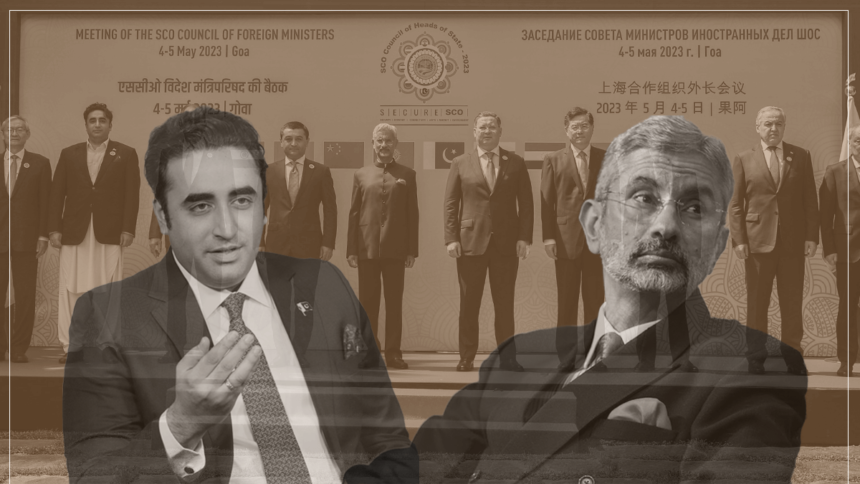
Sher Baz Khetran

March 01, 2026
By | Sher Baz Khetran

It was anticipated that the stalemate in bilateral relations between India and Pakistan will subside and dialogue might commence when Pakistan announced on April 20 that its Foreign Minister, Bilawal Bhutto Zardari will attend the Shanghai Cooperation Organization (SCO) Council of Foreign Ministers Meeting in Goa, India.
It was the first visit by any Pakistani FM after 12 years. The main reason for the prevailing deadlock has been the BJP government’s unilateral acts in Indian- administered Kashmir on August 5, 2019 violating the UNSC resolutions, the 4th Geneva Commission, and the Simla accord. This unilateral act by India now is the main reason for the degradation of relationship between Pakistan and India.
As a crucial strategic partner within the SCO, Foreign Minister Bilawal Bhutto Zardari played a constructive role, prioritizing positive engagement over political posturing. The visit aimed at strengthening Pakistan’s multilateral relations with regional countries within the SCO. There was no formal bilateral engagement between Pakistan and India as was anticipated during the visit but there was widespread optimism among the policy circles that this meeting could serve as an icebreaker between the two countries. It was hoped that the summit would provide an opportunity for a limited dialogue and potentially pave the way for a future official engagement between both countries, signaling a step towards concrete progress.
Unfortunately, the response from Indian Foreign Minister Jaishankar during the summit was disappointing and not in line with the conduct expected of a senior diplomat. Instead of focusing on regional cooperation and the shared goal of countering terrorism, Jaishankar resorted to blaming Pakistan and labeling Mr. Bilawal Bhutto as the “FM of terrorists.” In contrast, Bilawal Bhutto eloquently presented Pakistan’s perspective by refraining from engaging in accusatory rhetoric or political posturing for personal gain, demonstrating a commitment to positive engagement in the summit. More importantly, Bilawal Bhutto emphasized the need for transnational regional efforts and the exchange of experiences to combat terrorism effectively at regional level.
According to experts, this is an election year in India and the ‘Pakistan factor’ in domestic political landscape of India plays a critical, if not a deciding role so no Confidence Building Measures (CBM) was expected from the BJP government during this visit due to its far-right vote base, but Pakistan achieved what it had set out to accomplish.
It is important to note that the SCO summit is a platform for multilateral engagements, not for settling bilateral disputes. Thus, Jaishankar missed the opportunity to utilize the venue in line with the objectives and mandates of the SCO. Nonetheless, this was a real missed opportunity for India to contribute towards peace and prosperity in the region, being the largest country in the South Asian region.
India should have taken this opportunity to address the pressing regional issues and how they could be tackled within the SCO framework, such as:
Climate Change: The non-traditional threats posed by climate change to the region in general and India and Pakistan, in particular, are projected to be far greater than traditional threats in the coming years that need regional collaboration.
Terrorism is a major concern in South Asia. The SCO has a robust counter-terrorism structure, RATS, and focuses on security issues. It would have been valuable for India to engage with SCO member states/observers to share perspectives on the evolving security situation in Afghanistan after the US troop withdrawal. Nonetheless, collaboration with Pakistan through joint investigations, coordinated operations, and best practice sharing can strengthen border security, intelligence analysis, and counterterrorism strategies.
Economic development: Bilateral trade between India and Pakistan was at $3.6 billion during the peace process from 2004 to 2008. However, since August 2019, all trade ties have remained suspended. It is evident that both nations should not continue to miss out on the significant benefits that can be derived from establishing trade and investment relations. We need only look at the enduring trade and investment partnership between China and the US, despite their strategic competition, to recognize the value of maintaining such ties. Therefore, it is crucial for Pakistan and India to embark on initiatives that focus on infrastructure development, enhancing connectivity, and facilitating access to essential cross-border commodities and services.
Regional connectivity has gained significant importance as countries face disruptions in the global supply chain due to the Covid-19 pandemic and the Ukrainian crisis. In response, many countries are seeking regional cooperation to mitigate the negative effects. Bi/multi-lateral cooperation among major players in the subcontinent can play a crucial role in fostering economic and social development.
Poverty alleviation: While both countries have significant populations living below the poverty line, India’s share is considerably larger. Establishing economic cooperation between Pakistan and India can play a crucial role in addressing this issue on a larger scale.
Therefore, it is crucial for both India and Pakistan to re-evaluate their bilateral relationship and address the aforementioned non-traditional security issues and socioeconomic problems. However, building trust remains a challenge given the complex nature of the India-Pakistan relationship, political dynamics, and other factors. Achieving meaningful and long-lasting results necessitates sustained commitment, cooperation, and efforts to foster trust from both countries.
Initiating a track II channel for negotiations is crucial for the mutual benefit of both countries. It is imperative that India seizes this opportunity and reciprocates by engaging with Pakistan. The bold decision of Pakistan’s Foreign Minister to attend the SCO summit in India was a positive development, signifying a willingness to foster better bilateral relations. By embracing this opportunity, India can contribute to creating an atmosphere of trust and openness, paving the way for meaningful discussions and cooperation between the two countries.
Despite India’s reluctance, Islamabad has consistently taken initiatives for improved ties, such as releasing fishermen after Mr. Bhutto’s recent visit to India. It is hoped that India’s leadership will recognize the importance of reciprocating Pakistan’s goodwill gestures. Such actions will not only enhance bilateral relations but also contribute to peaceful coexistence in South Asia and beyond. The suffering endured by the people of both countries and the impediment to stability, growth, and development necessitate a shift towards resolving these longstanding conflicts.
Disclaimer: The opinions expressed are those of the authors. They do not necessarily reflect the policy of the organisation.
Sher Baz Khetran works as a Research Fellow at the Institute of Strategic Studies (ISSI) Islamabad. His area of research is Balochistan & non-traditional security challenges. He tweets @khetran11